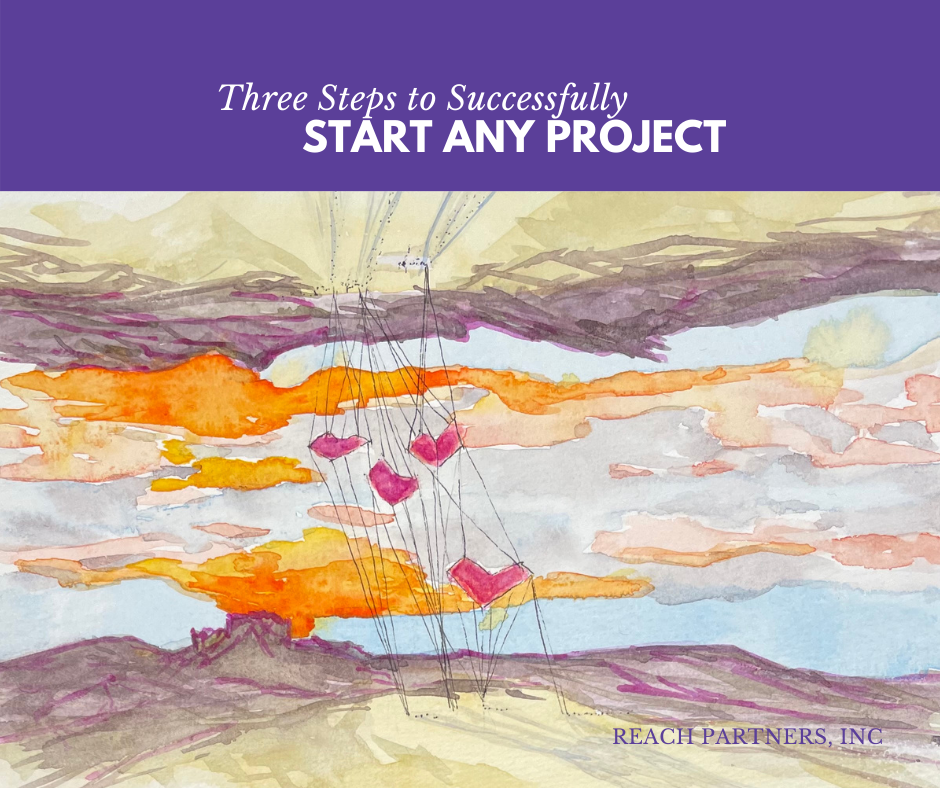|
You’ve probably heard the Chinese proverb: A journey of a thousand miles begins with a single step. Another way to think about it: all big and complex things start with a simple step forward. In many situations, however, that first step might not be so simple. You likely have your own personal list of to-dos that have been gnawing at you for what seems like forever. For whatever reason, you keep procrastinating and pushing them to the back burner. That tendency is multiplied when you consider projects that require a team or collaborative approach. Maybe you have a list of projects that you want finished, but you never seem to have the time, energy, or organization to move them forward. At Reach Partners we’ve seen projects fail to launch or stall because a successful start was an obstacle. Starting is harder than it looks. Projects fail to start for all sorts of reasons: lack of vision, misunderstanding, confusion, procrastination. “Just do it” may work for athletes who love Nike, but most organizations and teams need a clear process before the project planning starts. Passion and enthusiasm may be driving forces behind an idea, but intentional actions are what turns ideas into reality.
Reach Partners has learned how to stay flexible and nimble throughout the process of a project. We’ve experienced time and time again that a successful start doesn’t just happen; it’s the product of strategy and purpose. It’s why we focus on three steps every time we start a project: listen, investigate, and gather. LISTEN On the surface, “listen” seems straight forward: pay attention so you can hear what someone is saying. This is particularly important when working with a team or group. By giving someone your full attention, you take time to understand and hear what is being said (and not just what you think someone is saying). You also build rapport and trust. Believe it or not, one of the hardest things to do in a group setting is to ask a question and then say nothing more. Silence is a powerful force – one that gives people time to think and space to talk. We find that when we listen, we learn more about the goals and purpose behind an idea. INVESTIGATE This is where you dig deep to discover facts and information. It’s also known as the “ask a lot of open-ended questions” stage. Use your how, what, when, why, who language to uncover the data that will later help you determine the scope of the project. Ultimately, you are trying to determine how the project fits into the goals of the business or collaboration. No questions are off-limits, which means individuals and groups need to be willing to be honest and forthcoming. (If the project has stalled in the past, why?) This is the stage where you may need to prompt conversation and use follow-up questions. GATHER This step is where you create space and opportunity for all the stakeholders (co-workers, volunteers for a collaborative effort) to come together and share what they want to happen. At this step, be sure to carefully document and record what everyone shares. It’s an opportunity to start listening for project expectations (goals, budget, timeline), as well as possible barriers or challenges. It’s also a chance to make sure everyone has the same background and foundation of information. As an outside partner, we find often that what is obvious to some in a group isn’t always apparent to everyone in the room. Listen. Investigate. Gather. Invest in these three steps and you’ll have a strong start to your project every single time. EDITOR'S NOTE: This post is adapted from a blog post that originally ran 7/26/2017.
0 Comments
Your comment will be posted after it is approved.
Leave a Reply. |
Reach PartnersYour partners in leadership. Categories
All
Archives
July 2024
|
|
|
Reach Partners, Inc
3330 Fiechtner Dr. Suite 100 Fargo, ND 58103-2321 701-271-8170 Copyright (C) 2024 Reach Partners Inc.
|

